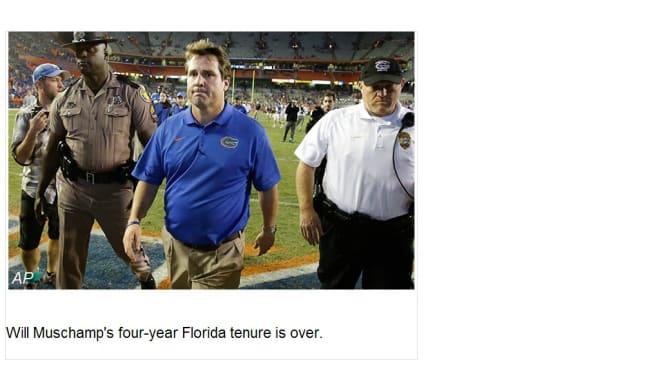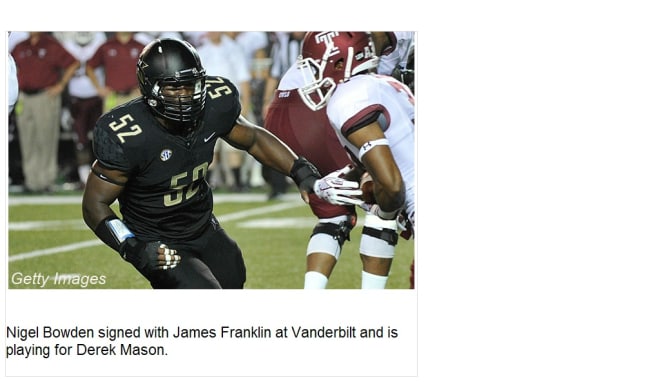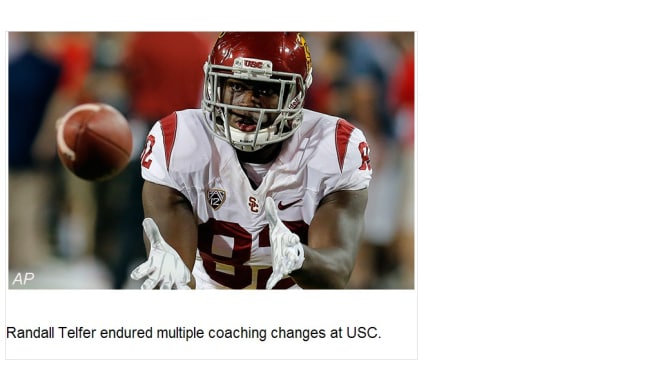Committing to a school, not a coach


When asked, just about any high school football prospect acknowledges his relationship with a particular college coach plays a big -- and in some cases the biggest -- role in his ultimate decision to commit to a given program. Of course, there are numerous other factors involved, including proximity to home, preferred degree offered, familiarity with student body or simply the campus.
Advertisement
However, communication with a given college begins and ends with that program's coaching staff.
And odds are, that staff will not be in place when a player's career comes to an end.
It's no secret colleges are offering kids earlier and earlier, and in turn prospects are verbally committing to colleges before they become high school seniors. Currently, the Rivals.com database lists 126 class of 2016 prospects as already committed to a school in one of the Power Five conferences.
In a recent study conducted by Rivals.com, the numbers suggest there's a 67 percent chance a class of 2016 Power Five commit will be playing for a different coach than who he committed to by the time he's a college senior.
Should a class of 2016 prospect commit this season, that means he's six football seasons away from his college senior season. Of the 65 power schools, only 22 (34 percent) have coaches in their sixth season or more. Conversely, 21 have coaches in their first or second season. The average tenure of a head coach is 5.38 seasons.
So while it's understandably important for a class of 2016 prospect to feel comfortable with the coaching staff, he should accept a stark reality: There's a strong likelihood he'll need to adapt to a new staff should he stay with his initial commitment throughout his career.
There are many reasons a college coach won't be around by the end of a high school junior commitment's fourth college football season. The coach could be fired for under-performance. The coach could be forced to or willingly resign amid controversy. The coach could leave for another program or on to the NFL. He could retire.
Whatever the case, coaching turnover is persistent at the college level.
Randall Telfer can attest to that. USC's fifth-year senior committed to Pete Carroll and eventually played for Lane Kiffin, Ed Orgeron and Steve Sarkisian during his stay at Troy.
"The one thing about having multiple coaching staffs is you can learn a lot of different perspectives," Telfer said. "I pretty much had a different tight ends coach every year. Each of them added to my skill set. Not all student-athletes have to go through this, but I don't necessarily see it as a negative. Going through adversity helps you grow as a man."
Telfer said he did not reconsider his commitment when Carroll left because the four-star was a USC fan growing up. And when Kiffen came in, Telfer was familiar with him because Kiffin was trying to recruit him when Kiffin was at Tennessee.
Kiffin had USC as a preseason No. 1 in 2012, but less than two years later, he was fired.
"When things went south (during the '12 season) it was a shock," Telfer said. "Coach Kiffin did his best to keep the team together, but when guys saw that things weren't going as planned, everything started to crumble."

At Vanderbilt, it was the coach's success that led to a team feeling jilted. James Franklin led the Commodores to three straight bowl games, an unheard of feat, and parlayed that into a reported six-year, $24 million contract at Penn State.
"I was upset at first," Vanderbilt linebacker Nigel Bowden said. "But very quickly, you start to realize it's a business."
For Bowden -- a 6-foot-1, 245-pound four-star out of Macon (Ga.) Central -- realizing the college football recruiting industry is a business wasn't so obvious at first. But as his college football career played out, he came to understand that at the end of the day, you are signing on to an institution.
"I chose Vanderbilt," Bowden said. "I talked to the coaches. I talked about Nashville and how it's the 'Country Music City'. It's a very small town. I come from a small town. At the end of the day, the coaches told me the truth. They're not there anymore, but what they said about the town is true."
Perhaps the most relevant factor in coaching turnover is the sense of urgency to succeed. With the 24/7 news cycle, the talking heads on radio and TV and the influence of social media, the patience threshold for allowing a coach time to grow a winning football program is brief.
For perspective, the longest-tenured Power Five coach is Virginia Tech's Frank Beamer, now in his 28th season with the Hokies. He currently boasts a 229-115-2 record heading into bowl season. A bowl win would put them at 7-6, thus giving Beamer 22 consecutive winning seasons dating back to 1993. However, in four of Beamer's first six seasons at Virginia Tech, he posted losing records and was a combined 25-39-2 in that span.
Would Beamer have survived such a rough start to his Virginia Tech career in today's era? Not likely.
Though the sense of urgency for a coach to succeed immediately is more prevalent today, so is the technology and resources available for a coaching staff to build its program. Instead of coaches reaching out to individual high schools and requesting a prospect's highlights like they had to in the past -- videos tapes which would be sent via snail mail and could take weeks to deliver -- now a coach can watch highlights online and see numerous prospects from around the country in a matter of minutes. Coaches can communicate with recruits via email and social media. High definition cameras, advanced software and electronic devices such as the iPad have all greatly increased the efficiency of film and playbook study.
So while the time a coach has to succeed has been reduced, so has the time it takes to build up a program.
As a result, a coach must win immediately and all the time. Gene Chizik led Auburn to a 14-0 season and a BCS championship in 2010 -- just his second season as Tigers head coach. In 2011, Auburn went 8-5 and finished 4-4 in the SEC, then in 2012 went 3-9 (0-8 in conference play) and Chizik was fired.
More recently, Florida coach Will Muschamp has already been informed he won't be back with the Gators next season. He is 28-21 in his fourth year in Gainesville and his Gators are bowl eligible. If the Gators win their bowl game in Muschamp's last hurrah, Muschamp will have finished with a winning season in three of the four years he coached the Gators, including an 11-2 season in 2012.
Though Muschamp had a winning record and appeared to be loved by his current players and by future prospects alike, he lost his job because he didn't compete well enough against fellow Power Five schools. Against that competition, he was only 19-19, and a .500 record at Florida doesn't cut it, especially when his predecessor, Urban Meyer, won two national championships in six seasons.
Muschamp's dismissal may already have an impact on the class of 2016. The Gators have three prospects from the class -- Chauncey Gardner, Tyler Byrd and Tre Jackson -- who committed to Florida before it was announced the 2014 season would be Muschamp's last with the program.
Should all three remain committed, they will have already endured at least one coaching change before even stepping foot on campus. None of the three have de-committed yet and both Byrd and Gardner expressed interest in maintaining their commitments.
"I'm committed to a school not a coach," said Gardner -- a four-star defensive back from Cocoa (Fla.) -- on the day it was learned Muschamp wouldn't be back.
Byrd, a four-star athlete from Naples (Fla.), said the strength of his verbal commitment was at "95 percent" at the time.
"I like coach Muschamp and I was looking forward to playing for him," he said. "But it doesn't affect how I feel about the Florida Gators and my commitment. I'm still solid."
The attitudes expressed by both Gardner and Byrd are necessary for any high school prospect, given the numbers regarding coaching turnover. Nebraska and Michigan commits are faced with the same dilemma now that Bo Pelini and Brady Hoke have been fired.

Also, should a class of 2016 Power prospect redshirt his freshman year -- as Telfer did -- the odds he has the same coach as a fifth year senior are even lower.
So what happens when a committed prospect is faced with the reality of working with a new coaching staff?
"You have to start all over," Bowden said. "You're in front of new coaches, in front of a new playbook, and playing in a new system. You have to make a name for yourself. The coaching staff probably doesn't know who you are. But you have the chance to get on the same page with them.
"At the end of the day, both of us are just here to win."
This season, Bowden became the first Commodore freshman ever to lead the team in tackles. He is also a Freshman All-SEC and a Freshman All-America candidate.
As for Telfer, he took advantage of redshirting his freshman year from an academic standpoint. He received his bachelor's degree early and is halfway through his graduate degree.
"Receiving a degree or two from USC means a lot more to me and my parents than who the coach is," Telfer said.
Power Five Coaching Turnover
CONFERENCE
AVG. TENURE
LONGEST TENURED COACH
1ST/2ND YEAR COACHES
ACC
5.46
Frank Beamer, Va. Tech (28)
5
Big Ten
5.0
Pat Fitzgerald, Northwestern (9)
3
Big 12
6.8
Bob Stoops, Oklahoma (16)
3
Pac-12
3.8
Mike Riley, Oregon State (12)
5
SEC
5.8
Mark Richt, Georgia (14)
5
Table based on 2014 season


Click Here to view this Link.